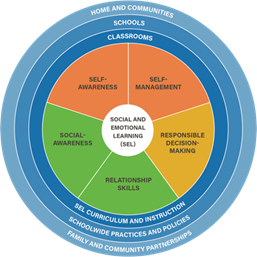There is no denying that social media has had a tremendous impact on how we humans interact. “Children today just don’t care, are irresponsible, don’t contribute to society, and are not very knowledgeable about the world when compared to children twenty to thirty years ago,” is something I have heard many adults say. For some children, not all, this statement is hard to deny, but why is it true for so many? There is no denying that social media has had a tremendous impact on how we humans interact. Could this be why so many of our youth lack empathy, discipline, character, and collaborative problem-solving skills?
Regardless of the cause in behavioral changes in adults and youth in the last twenty to thirty years, some would argue that these descriptors are indicative of a need for stronger social and emotional skills. The learning of these skills is commonly referred to by educators as Social Emotional Learning (SEL) and is defined as the process through which children and adults understand and manage emotions, set and achieve positive goals, feel and show empathy for others, establish and maintain positive relationships, and make responsible decisions (Casel, 2019).
“There is broad agreement among educators, policymakers, and the public that educational systems should graduate students who are proficient in core academic subjects, able to work well with others from diverse backgrounds in socially and emotionally skilled ways, practice healthy behaviors, and behave responsibly and respectfully (Association for Supervision and Curriculum Development, 2007; Greenberg et al., 2003)” (Durlak, Weissberg, Dymnicki, Taylor, & Schwllinger, 2011, n.p.).
The Collaborative for Academic, Social, and Emotional Learning (CASEL) provides a framework identifying five core competencies within three settings.
 Decades of research found that social and emotional learning incorporating the above five competencies resulted in increased student academic performance 11 percentage points above students who were not in such programs. (Durlak et al., 2011). The social and emotional learning programs also reduced aggression (by as much as one-half) and emotional distress among students, increased helping behaviors in school (prosocial behaviors), and improved positive attitudes toward self and others. Outcomes were immediate and long-lasting (up to three years after intervention) (Schonert-Reichl, Smith, Zaidman-Zait & Hertzman, 2012; Santos, Chartier, Whalen, Chateau & Boyd, 2011; Cain & Carnellor, 2008).
Decades of research found that social and emotional learning incorporating the above five competencies resulted in increased student academic performance 11 percentage points above students who were not in such programs. (Durlak et al., 2011). The social and emotional learning programs also reduced aggression (by as much as one-half) and emotional distress among students, increased helping behaviors in school (prosocial behaviors), and improved positive attitudes toward self and others. Outcomes were immediate and long-lasting (up to three years after intervention) (Schonert-Reichl, Smith, Zaidman-Zait & Hertzman, 2012; Santos, Chartier, Whalen, Chateau & Boyd, 2011; Cain & Carnellor, 2008).
Illinois and Kansas have adopted social and emotional learning standards and have begun implementing three distinct phases of social and emotional learning programs: readiness, planning, and implementation. “The most common problem when implementing SEL programs is a lack of teacher and administrator support for the program (Durlak, et al., 2011).” Vega (2015) noted knowledge-building, developing an SEL framework, ensuring teacher capacity and readiness to implement SEL, ongoing professional development, lesson evaluation and feedback, and systemic monitoring of implementation and outcomes must all be considered when implementing an SEL program otherwise significant setbacks will arise.
References
Cain, G. & Carnellor, Y. (2008). ‘Roots of empathy’: A research study on its impacts on teachers in Western Australia. Journal of Student Wellbeing, 2(1), 52-73. Retrieved from https://www.ojs.unisa.edu.au/index.php/JSW/article/viewFile/168/227
Casel. (2019). What is SEL? [website]. Retrieved from https://casel.org/what-is-sel/
Durlak, J.A., Weissberg, R.P., Dymnicki, A.B., Taylor, R.D., & Schwllinger, K.B. (2011). The impact of enhancing students’ social and emotional learning: A meta-analysis of school-based universal interventions. Child Development, 82(1), 405-432. Retrieved from https://casel.org/wp-content/uploads/2016/01/meta-analysis-child-development-1.pdf
Santos R. G., Chartier M. J., Whalen, J. C., Chateau D., & Boyd, L. (2011). Effectiveness of school-based violence prevention for children and youth: Cluster randomized controlled field trial of the Roots of Empathy program with replication and three-year follow-up. Healthcare Quarterly, 14, 80-91. Retrieved from https://www.longwoods.com/content/22367
Schonert-Reichl, K. A., & Lawlor, M. S. (2010). The effects of a mindfulness-based education program on pre- and early adolescents’ well-being and social and emotional competence (PDF). Mindfulness, 1, 137-151. Retrieved from http://mindup.org/thehawnfoundation/
Vega, V. (2015). Social and emotional learning research review: Avoiding pitfalls. [website]. Retrieved from https://www.edutopia.org/sel-research-avoiding-pitfalls
